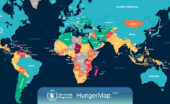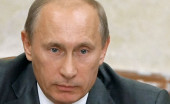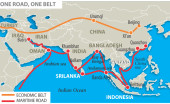Re Ian Bremmer 'Could third-party candidates upend the 2024 US election?' 3 April The current political movement in the USA…
Wednesday Night #1766
Written by Diana Thebaud Nicholson // January 6, 2016 // Wednesday Nights // Comments Off on Wednesday Night #1766
After a fascinating and informative debate on climate change, it was agreed that ascribing blame -even establishing causes- is unimportant. What is important is to move ahead and alleviate, mitigate, or otherwise cope with the results.
Inevitably, the focus moved to the oil-producing countries and so to the current situation in the Middle East,
P R O L O G U E
All Stories Are the Same
From Avatar to The Wizard of Oz, Aristotle to Shakespeare, there’s one clear form that dramatic storytelling has followed since its inception.
Maybe so, but it is hard to imagine that even the master story tellers would come up with the intricate tale of the state of the world as we enter the murky forest – or is it a swamp? – of 2016.
The most recent and worrisome development was Tuesday’s news from The Hermit Kingdom that it had detonated a hydrogen bomb, after conducting a fourth nuclear test. According to the BBC “Experts believed before the fourth test that North Korea was still some years from being able to hit a target with a nuclear bomb delivered by a missile. But it is crystal clear that it is absolutely determined to be able to do so. It is also clear that it is improving its abilities rapidly.” Not a happy prospect.
Meanwhile, we have all been watching developments in the Middle East since the Saudis executed Nimr Al-Nimr, provoking angry reaction from Iran and its allies while creating havoc among the US and European policy wonks who fear for the talks on Syria and the Iranian nuclear agreement. We can only agree with the headline of the Deutsche Welle piece, Tehran and Riyadh are two murderous theocracies. But that is not helpful.
Suggested reading:
Saudi Arabia stews in policy hell: Spengler
Saudi Arabia finds itself isolated, abandoned by its longstanding American ally, at odds with China, and pressured by Russia’s sudden preeminence in the region. The Saudi-backed Army of Conquest in Syria seems to be crumbling under Russian attack. The Saudi intervention in Yemen against Iran-backed Houthi rebels has gone poorly. And its Turkish ally-of-convenience is consumed by a low-level civil war. Nothing has gone right for Riyadh.
The oil price collapse turns the competition between Saudi Arabia and Iran into a race to the bottom. But the monarchy’s panicked response to its many setbacks of the past several months raises a difficult question. In the past, the West did what it could to prop up the Saudi royal family as a pillar of stability in the region, despite the Saudis’ support for jihadi terrorism. Soon the West may not be able to keep the House of Saud in power whether it wants to or not.
In a highly relevant post on Foreign Policy from earlier in 2015, Nick Danforth argues that the short-lived treaty of Sèvres has been largely forgotten in the West, but has a potent legacy in Turkey, where it has helped fuel a form of nationalist paranoia some scholars have called the “Sèvres syndrome.” Forget Sykes-Picot. It’s the Treaty of Sèvres That Explains the Modern Middle East. — Ninety-five years ago, Europe carved up the Ottoman empire. That treaty barely lasted a year, but we’re feeling its aftershocks today.
In light of the above – and all the other world news, The Decline of International Studies is particularly alarming.
“Given that no one can know where the next crisis will erupt, having a broadly competent reserve of experts is the price of global engagement. Yesterday’s apparent irrelevancies—the demographics of eastern Ukraine, for example, or popular attitudes toward public health in West Africa—can suddenly become matters of consequence. Acquiring competence in these sorts of topics forms the mental disposition that J. William Fulbright called “seeing the world as others see it”—an understanding that people could reasonably view their identities, interests, politics, and leaders in ways that might at first seem bizarre or wrong-headed. It also provides the essential context for distinguishing smart policy-specific questions from misguided ones. Great powers should revel in small data: the granular and culture-specific knowledge that can make the critical difference between really getting a place and getting it profoundly wrong.
International affairs education and research are also part of a country’s domestic life. Democratic societies depend on having a cadre of informed professionals outside government—people in universities, think tanks, museums, and research institutes who cultivate expertise protected from the pressures of the state. Many countries can field missile launchers and float destroyers; only a few have built a Brookings Institution or a Chatham House. Yet the latter is what makes them magnets for people from the very places their institutions study. The University of London’s nearly century-old SOAS, for example, which focuses on Asian and African studies, is a beehive of languages and causes, where Koreans, Nigerians, and Palestinians come to receive world-class instruction on, among other things, North and South Korea, Nigeria, and the Palestinian territories.
All of this points to just how important international and regional studies can be when they are adequately funded, publicly valued, and shielded from the exigencies of national security. Their chief role is not to enable the makers of foreign policy. It is rather to constrain them: to show why things will always be more complicated than they seem, how to foresee unintended consequences, and when to temper ambition with a realistic understanding of what is historically and culturally imaginable. For more than half a century, the world has been shaped by the simple fact that the United States could look at other countries—their pasts and presents, their myths and worldviews—with sympathetic curiosity. Maintaining the ability to do so is not only a great power’s insurance policy against the future. It is also the essence of an open, inquisitive, and critical society.”
Meanwhile, The Straits Times has this advice for the remaining beleaguered academic experts. To shape policy, professors should start penning commentaries in popular media.
Prof, no one is reading you
Even if scholars agree on the importance of publishing in the popular media, the system plays against them. Publications in peer-reviewed journals continue to be the key performance indicator within academia: whether anyone reads them is a secondary consideration
An average academic journal article is read in its entirety by about 10 people. To shape policy, professors should start penning commentaries in popular media.
Many of the world’s most talented thinkers may be university professors, but sadly most of them are not shaping today’s public debates or influencing policies.
Indeed, scholars often frown upon publishing in the popular media. “Running an opinion editorial to share my views with the public? Sounds like activism to me,” a professor recently noted at a conference, hosted by the University of Oxford.
The absence of professors from shaping public debates and policies seems to have exacerbated in recent years, particularly in social sciences.
You have certainly seen those electronic messages that detail all the wonderful benefits that refugees are receiving while pensioners suffer deprivation. They are no doubt satisfying to those who believe that Canada should not act on humanitarian instincts to save a tiny percentage of the refugees awaiting help, however, there is NO truth to the allegations; No, Canada doesn’t spend more on refugees than on pensioners.
A different message about our supposed woes (we have enough real ones, why add to our burden?) comes from the media, who, rightly, constantly remind us -and the government- that we are woefully under-served by the medical system, implying that we are all at risk, however Christopher Labos, M.D. wants to set the record straight regarding the general health of the population. In Opinion: Most Canadians’ health is pretty darn good, he reminds us that “The truth of the matter is that people are living longer and living better, too. Yes, the population level burden of disease is rising and this is important for policy-makers. But your risk as an individual is lower now than it has ever been.
“So with this new-found knowledge, I hope you look to 2016 with an upbeat attitude, or what Socrates called eudaimonia, the sense of waking every morning and facing the world with confidence, energy and expectation rather than loathing and dread.” That is as good a new year’s resolution as any.
On the other hand, the economy is ailing and could it be that this nugget is an indicator?
The Final Days of the Bitcoin Foundation?
With support dwindling, funds almost depleted, and ex-board members under criminal investigation, bitcoin’s pioneering advocacy group is a symbol for the digital currency’s growing pains.
Not everyone is suffering from an ailing economy, however. According to a new report by the Canadian Centre for Policy Alternatives’ Hugh Mackenzie, the country’s top 100 CEOs made what the average worker makes in a year by lunchtime Monday.
Odds & Ends
Mark Zuckerberg Is Building An A.I. Butler To Help Around The Home
The tech billionaire said he’d check out existing technology before teaching the system to understand his voice to control “everything in our home — music, lights, temperature and so on.”
Zuckerberg revealed he’ll also instruct it to recognize friends’ faces when they ring the doorbell — and monitor newborn daughter Maxima’s room for unusual activity when he’s not with her. “On the work side, it’ll help me visualize data in VR (virtual reality) to help me build better services and lead my organizations more effectively,” he said.
An Unsung 2015 Newsmaker: The Delete Key
In BC and beyond, it became a sensation among politicians and staff
An emoji was the word of the year for Oxford Dictionaries in 2015. A suffix, -ism, got the nod from Merriam-Webster. But I’m going with Delete, or, more precisely, the Delete key, for the newsmaker of the year.
Thanks to Ron Meisels for this somewhat surprising view of a kinder, gentler Donald Trump 25 years ago. Not much evidence of the younger man on the campaign trail today; and isn’t it fun that he has turned his birther guns on Ted Cruz. And there will surely be more before the Iowa caucuses and New Hampshire primary.
Event: On Thursday,6-8pm at the University Club, the NATO Association of Canada presents a panel discussion on NATO, Russia and the Future of Scandinavian defence. Details RSVP 514-288-0201
Do have a look at The Global Economy 2016 and Predictions for 2016



